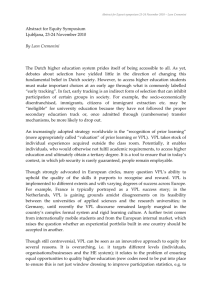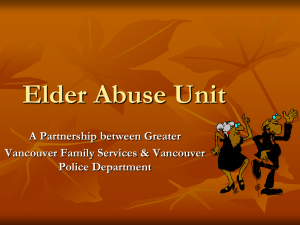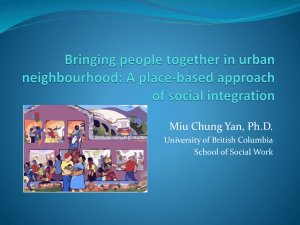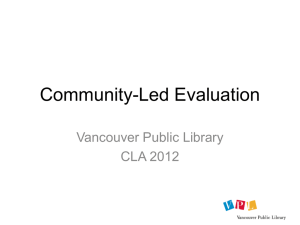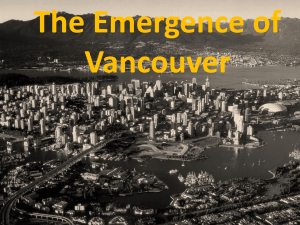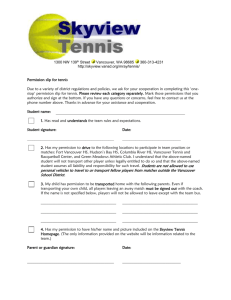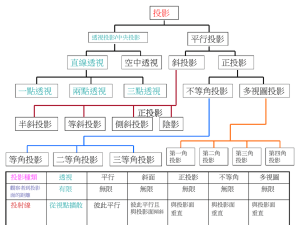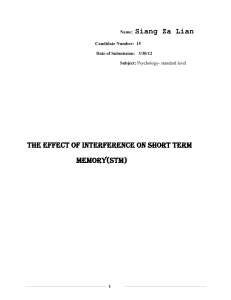Date: March 1, 2013 Libraries and Literacy 2012 Provincial Library
advertisement
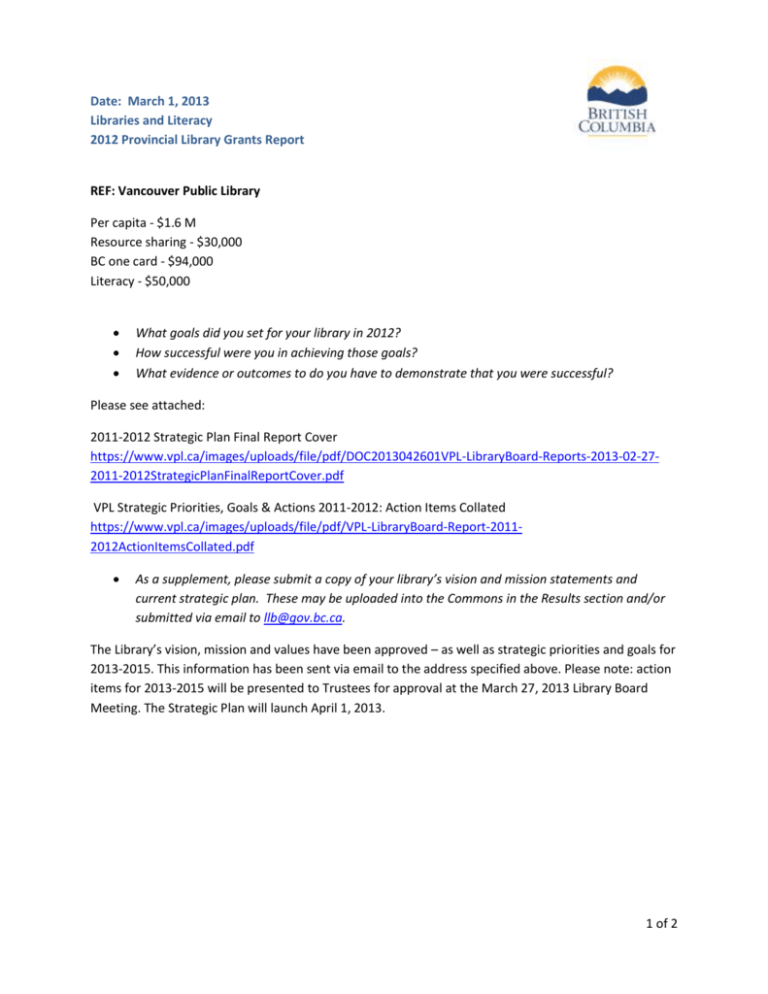
Date: March 1, 2013 Libraries and Literacy 2012 Provincial Library Grants Report REF: Vancouver Public Library Per capita - $1.6 M Resource sharing - $30,000 BC one card - $94,000 Literacy - $50,000 What goals did you set for your library in 2012? How successful were you in achieving those goals? What evidence or outcomes to do you have to demonstrate that you were successful? Please see attached: 2011-2012 Strategic Plan Final Report Cover https://www.vpl.ca/images/uploads/file/pdf/DOC2013042601VPL-LibraryBoard-Reports-2013-02-272011-2012StrategicPlanFinalReportCover.pdf VPL Strategic Priorities, Goals & Actions 2011-2012: Action Items Collated https://www.vpl.ca/images/uploads/file/pdf/VPL-LibraryBoard-Report-20112012ActionItemsCollated.pdf As a supplement, please submit a copy of your library’s vision and mission statements and current strategic plan. These may be uploaded into the Commons in the Results section and/or submitted via email to llb@gov.bc.ca. The Library’s vision, mission and values have been approved – as well as strategic priorities and goals for 2013-2015. This information has been sent via email to the address specified above. Please note: action items for 2013-2015 will be presented to Trustees for approval at the March 27, 2013 Library Board Meeting. The Strategic Plan will launch April 1, 2013. 1 of 2 In the letter that accompanied your grants, we articulated the following priorities for provincial funding: 1. Sharing of library resources (through direct patron requests and BC OneCard); 2. collaboration with other libraries and community partners to enhance services and programs, extend the reach of libraries and leverage shared costs; 3. community engagement (engagement processes to understand what the community needs and wants); 4. open government (for example, supporting citizens to use open data; making library data openly available; modelling transparency about library decisions) and 5. supporting early reading. Further details about how the Vancouver Public Library supported these priorities are included below. 1. Sharing of library resources (through direct patron requests and BC OneCard) Vancouver is a destination for many BC residents, for both business and pleasure. Although BC OneCard users represent only 0.1% of VPL circulation, the amount of activity is substantial relative to other libraries in the province. Active BC OneCard borrowers at VPL as of January 1, 2013 were 1,238, a slight increase over the previous year. These patrons borrowed 11,178 items, compared to total circulation of 9,969,158. VPL supports and promotes the BC OneCard program by making the cards and brochures visible and available at all locations. We train staff to explain and offer this option to users and to highlight the advantages. We provide clear and simple instructions for staff accepting items for return. Our shipping department ensures that OneCard items are returned via Canada Post to lending libraries promptly and in good shape. 2. Collaboration with other libraries and community partners to enhance services and programs, extend the reach of libraries and leverage shared costs; (a) Neighbourhood Family Literacy Committee - VPL Hastings Branch, Kiwassa Neighbourhood House with funding from Raise a Reader (Decoda Literacy Solutions). Raise-a-reader/ Decoda provided funding to Kiwassa Neighbourhood House and the Hastings branch of Vancouver Public Library, enabling them to collaborate and offer three 5 week sessions of Tales for Tots to families in the Hastings Sunrise area. This part of Vancouver was one of those identified as vulnerable in Clyde Hertzman’s HELP mapping project. Please find below a narrative report of the Tales for Tots program provided by a Vancouver Public Library staff member. Kiwassa Neighbourhood House provided the space for the first three programs in each session and created the posters. The last two programs in each session were held at the Hastings branch. The first session in June was attended by eighteen families with children ranging in age from 7 months to 4 years. Twelve of the families came regularly and each week there were several drop ins. The second session in August was attended by14 families, including several returning families. The third session was held in November and was attended by 15 families, many coming for the first time. Both the second and third sessions included children from 4 months old to 4 years. The families represented a variety of backgrounds, including French, Chinese, Japanese, Irish, Ecuadorian, Honduran, Indian and Middle Eastern. There were both parents and grandparents along with the children. Although there was smaller attendance at the Hastings branch, this made the atmosphere more intimate. Parents stayed longer, chatted with each other over snack and formed bonds and friendships. It was not unusual for me to start the program at 10:00 and have the last families leaving at close to noon. The programs were designed to be one hour long. Each began with a half hour story time. The hello song at the beginning included the names of all the participants, so that they could get to know each other. The storytimes followed the Language Fun model, in that each week the same story was told three ways; first as a picture book, then as a felt story and finally as a told story with props. Rhymes and songs were interspersed between the stories. Each storytime was followed by a healthy snack so that families could sit and relax with each other. A simple craft was included as well. At the end of the each week’s program, caregivers were given a list of rhymes and songs related to the story and a page of simple and enjoyable literacy based activities relating to the story. Following the last session, the adults created their own felt story and board. I observed friendships being formed and ideas being exchanged. Many grownups remarked on how much it meant to them to get together and share this time with their children and with other families. Several also talked about rhymes and songs that they had learned in the program which were now part of their home repertoire of favourites. Over the three sessions, several adults who came to the branch programs told me that they didn’t normally visit the library. Many were not aware of children’s library cards and their accompanying advantages. Some were surprised to learn that the library offered free programs for their children. I made and renewed library cards for both children and adults. Last month, while doing my program for little babies at the Children’s Library, I saw a familiar face among the participants. One of the mothers who attended the third session at Kiwassa/Hastings with her baby had made the trip downtown to see what other programs the library might offer her family. A measure of the success of this partnership is Kiwassa Neighbourhood House’s willingness to run the program with Vancouver Public Library again this year, and Decoda’s funding of it for a second year. (b) Neighbourhood Family Literacy - Kensington Branch, Cedar Cottage Neighbourhood House (Kensington – Cedar Cottage Literacy Task Force) and Decoda. The Kensington Library staff was active participants with the Cedar Cottage Family Literacy plan in 2012. Funding for both was made available from Decoda and Raise a Reader. The Seniors’ Tea was held on July 26, 2012 with 17 participants, many of whom had not been to the library before. The seniors were reached through the Cedar Cottage Neighbourhood House. During the Tea, staff solicited input from the Seniors about what types of programs they wanted from the library and we received quite a lot of feedback. One of them was on ‘Writing’ especially “Memoirs” and as part of the Fall Into Writing on the Eastside Series, we have Bonnie Nish from Pandora’s Collective coming to do a workshop titled: “Finding our Stories”. In addition, other staff from VPL attended including: staff from the Selections Team, Multilingual department and Outreach Services to gather direct feedback from the participants at the Tea for suggestions on what to add to the collection at the Kensington branch. In addition, VPL training staff attended to give eBook demonstrations. This Tea was covered in the Vancouver Sun. See http://www.vancouversun.com/literacy/raiseareader/seniors+steeped+community+engagemen t/7228359/story.html The second initiative offered at the Kensington branch as part of the literacy plan and with funding from Decoda and Raise a Reader was the development of the Adult Summer Reading Club program this summer. 40 Adults signed-up and Don Davies, MLA for Kingsway made each participant a fabulous ASR Certificate and we were able to provide a Sony eReader with a free Tutorial on downloading VPL eBooks as the Grand Prize. (c) Computer literacy training offered at the Mt Pleasant branch and UBC Learning Exchange: this consisted of three sessions in 2012 with a total participation of 18 individuals who came for an in-depth one-to-one training on self-identified basic computer skills. Those who participated enjoyed the opportunity to learn at their own pace in an atmosphere less intimidating than a classroom session. (d) Vancouver Inspiration Pass launch: full pass details are online at www.vpl.ca/inspirationpass. Pass program started Nov. 1, 2012. Patron interest in the Vancouver Inspiration Pass was considerable: within two days of the launch, more than 3,300 patrons had placed holds for the pass. Feedback to VPL and the City from program participants and partners has been enthusiastic and appreciative, illustrating the success of the program in fostering access, inclusion and community-building. A total of 120 passes are available every two weeks across the entire VPL system (20 at the main branch downtown and five at each of the community branches across the city). Partners: Thanks to the program’s partners – 19 in all – Vancouver library card holders can use their free library card to check out the best that their city can offer – including popular attractions, museums, heritage sites, fitness facilities, world-class gardens and musical performances. Participating venues include: Arts and culture: Vancouver Art Gallery; Vancouver Bach Choir; Vancouver Opera and Vancouver Symphony Orchestra Fitness and recreation: Vancouver Park Board fitness centres, swimming pools, skating rinks, and pitch and putt golf courses Museums and heritage: Museum of Vancouver; Roedde House Museum; UBC Museum of Anthropology; Vancouver Maritime Museum and the Vancouver Police Museum Science and nature: Beaty Biodiversity Museum; Bloedel Conservatory; Dr. Sun Yat-Sen Classical Chinese Garden; H.R. MacMillan Space Centre; Nitobe Memorial Garden; Science World; UBC Botanical Garden; Vancouver Aquarium and VanDusen Botanical Garden Patron and partner feedback: "I was really happy about this offering. I am in Vancouver about ten years. I have never been to some of those places. Being a middle taxpayer, we do not have any assistance and our earnings are just about to cover basic needs. I appreciated this opportunity to explore Vancouver." -via email "He said to tell you that his family is ‘high fivin’ each other over this pass’ – they are very stoked to be able to explore places in Vancouver they had never been before, like the symphony or opera; thought they were just for the upper crust." - VPL staff paraphrasing of patron phone feedback "A pass like this means that not only do we get to check something out in this city (nice to do when you are a newcomer here – we moved here two years ago so I could attend graduate studies) but it also means that we don’t have to spend a fortune and we can get the girls a treat!!" -via email On average, pass users visit roughly seven of the participating venues during their borrowing period; the most venues (so far) visited by one pass-user is 16, an average of more than one a day over the two-week borrowing period. 3. community engagement (engagement processes to understand what the community needs and wants); (a) Collections: The primary objective for 2012 was to support at least 4 projects, representing adults, teens and children. The projects completed and documented included developing a gardening collection at Mount Pleasant Branch to support a local community garden, working with the Musqueam community to develop a children’s Aboriginal collection at Dunbar Branch, engaging members of the GLBTQ community to enrich the Rainbow Collection at the Joe Fortes Branch, kid‐led book buys during the Summer Reading Club, eight teen led book buys with Teen Services throughout the year, and working with Teen Services to establish a Teen Manga Advisory Group. An Aboriginal Collections Working Group developed a draft collection development statement to guide staff, and initiated a pilot to engage the Aboriginal community in collection building for the Mount Pleasant Branch. Over 25 community‐led initiatives took place in 2013 with Vancouver communities, substantially exceeding the original target of at least 4 activities. (b) Teens: The Teen Services Strategic Plan was completed in early 2012. The plan was developed in consultation with youth. Through mentorship teens developed significant projects such as interactive art (“Wall Time;”) spoken word nights (“Poetry Folk;”) branch film screenings; after‐hours games; craft activities; and board game events. Many teen‐led events attracted first time library users. Most programs at Central involved teens coming from many parts of the city, bringing diverse groups of youth together. A Teen Manga Advisory Group (TMAG) was created. Four additional Teen Advisory Groups (TAGs) were formed in the branches. Branches including Oakridge, Britannia, South Hill, and Mount Pleasant have worked with teens to create or improve teen spaces. Teen Services and the TAG worked with Marketing to develop a distinct visual teen identity to be used with the VPL logo. 3,034 new library cards were issued to teens in 2012. This represents a 7% increase in one year, and holds true for age cohorts (e.g. 14‐ year‐olds in 2012 held 7% more library cards than 13‐year‐olds in 2011). For the first time the number of teen programs in branches exceeded the number at Central (60% to 40%), indicating a broader distribution of services to teens. 47% of all programs were teen‐led. (c) Community Engagement: Please see the final report of our Free-for-all Engagement Process here: https://www.vpl.ca/images/uploads/file/pdf/VPL-LibraryBoard-Report-20112012ActionItemsCollated.pdf (Pages 1 & 2, Engage With Community, Goal 1, Action A) 4. Open government (for example, supporting citizens to use open data; making library data openly available; modelling transparency about library decisions) VPL launched a series of open data sets this year in support of the movement toward open government. These include data about the size of the library’s collection including formats and locations; circulation data including by branch, language and format, and aggregated patron data including by year of birth, postal code FSA and city. The data sets are available from 2003 to 2012 at www.vpl.ca/opendata 5. Supporting early reading Please see below for a brief description of the many Vancouver Public Library programs and partnerships. Mother Goose Programs 15 programs with 149 sessions benefited 3,669 families and children. Delivered in collaboration with these community partners: Killarney Community Centre; Kensington Community Centre; Britannia Community Education Program (2 programs in Spanish);Frog Hollow Neighbourhood House (in Mandarin & Cantonese) long-standing community partnerships were strengthened, and we were able to reach “at-risk” families and enroll the families who are hardest to reach In addition to the externally funded Mother Goose programs, the EYC also partnered with community service providers to run 5 additional Mother Goose programs which including one for children with special needs and two Chinese/English programs. Man in the Moon Programs Man in the Moon program at four locations (3 library branches and 1 community centre) , for four series (Winter, Spring, Summer and Fall) of 8 weeks per series All the programs were run either in the evening or on the weekends when male caregivers are available. 12 programs with 88 sessions benefited 2,104 dads and other male caregivers and their children. The program attracted the attention of libraries and other agencies in Canada and the USA o Albion Branch of the Toronto Public Library requested, and received VPL approval, to use the program trademark. o Okanagan Regional Library (ORL) is interested in having a VPL-led Man in the Moon workshop for their staff. o Email inquiry was sent by a librarian from Marysville, WA who learned of the program on a public library blog. o A Child and Youth worker at the Cariboo Chilcotin Child Development Centre Assoc. at Williams Lake, BC called to learn more about the program. Alligator Pie This early literacy program focuses on delivering literacy-based, needs appropriate storytimes in childcare settings. Programs are delivered in the Downtown Eastside to reach children who are most vulnerable on the EDI scale. Programs also support childcare providers by offering opportunities for professional development including workshops for staff. Programs were delivered at 7 childcare centers Daycare groups have become more frequent library users, borrowing library resources and making more library visits. Parents and caregivers bring the children to the library more regularly than before. Early Years Programs librarians continued to do both outreach and community engagement work in the community, working with community service providers and institutions, to provide early literacy programs in our community, with special focus on the vulnerable and marginalized families and children in Vancouver. Language Fun Storytime These are early literacy programs done in collaborative partnership with Speech-Language Pathologists from Vancouver Coastal Health and directed for children 3-5 years with speech language delays. Seven Language Fun Storytime programs were provided in (Winter, Spring and Fall) in library branches or in neighbourhood houses. Language Fun Storytime was nominated for the 2012 The Council of the Federation Literacy Award for British Columbia. Tasty Tales Program Tasty Tales programs combine healthy eating and nutrition with early literacy for the mothers and their pre-school children. Done in partnership with the Vancouver School Board, the Vancouver Public Library, and the Vancouver Coastal Health’s Nutrition Program. There were four Tasty Tales programs at four elementary schools with a total of 19 sessions that were attended by 321 adults and children. The program’s popularity with the families led to a collaboration and partnership with more schools which agreed to fund parts of the program. Storytime at the Food Banks The EY team continued weekly storytime programs, book exchanges and library information provision at three (3) food bank sites A Surrey Public Library Youth Services Librarian inquired about programs because they were considering a similar initiative. Circles of Care and Connection (Program for Refugee Families) In 2012, EYC partnered with the Circles of Care and Connection, a storytime and snack program for refugee families coordinated by the Mt Pleasant Neighbourhood House. There were two programs for refugee families held at Kensington and Fraserview branch libraries. This provided an opportunity to introduce the library to the newcomer families. Workshops, Parent Talks Workshops for parents, early childhood educators, daycare & preschool staff were delivered in the community. The topics included new rhymes and songs, bilingualism, early literacy, “make and take” workshops, storytime 101, puppetry workshop, babies and books, language development through storytime, etc. It should be noted that these workshops count towards accreditation and professional development for early childhood educators. Several sessions were in Chinese. Multilingual /Multicultural Programs Cantonese and Mandarin Storytimes and Tagalog storytime at International Language Day Storytimes to the Somali, Latin American and Vietnamese groups of the CAPC (City Action Program for Children) of the MOSAIC settlement provider. Also these programs for the Healthiest Babies Possible Program: the Asian/Multicultural Mothers group, the Middle Eastern Group, the South Asian group and the Aboriginal group. Baby Welcoming Programs, where families are invited to bring their baby to the library to register for library cards, participate in a babytime program and connect with other community members, were held at VPL branches. Programs were offered in French; Spanish; Cantonese; Mandarin; Korean; Tagalog and Punjabi/Hindi. One program was offered for Aboriginal families. Additional Programs Introduced in 2012 Reading Tails. This program uses therapy dogs to engage children who are struggling with reading. Play-based programs for school-aged children including “Lego TM Block Party,” Family Board Game Nights” and “Altered Books.” Kid-led book buys started (CHL and other locations including a parent-led book buy with the Babytime families from FHL) Additional evening and weekend storytime programs were added at branches Resources to support Literacy We added 50 storytime kits to our collection. Kits contain 10 picture books, a felt story, puppets, a CD, toys, and lists of rhymes, songs and activities which can be borrowed by licensed childcare providers and early childhood educators. Each kit is based on a theme. Themes were developed in consultation with early childhood educators. We provided Deposit Collections at daycares, preschools and other community spaces including the Aboriginal Mother Daycare Centre, the International Village Daycare and Kiwassa Variety Children’s Centre. There consist of children’s books which have been withdrawn from the VPL collection. Significant Community Partnerships Vancouver School Board VPL won a 2012 Partnership Excellence Award for participation in the Welcome to Kindergarten In 2012 VPL received a partnership excellence award from the Learning Partnership for our collaborative approach with VSB in the delivery of this program. VPL staff attends the school team planning workshops, participate in WTK family orientation and elementary schools and invite the kindergarten kids to visit the branch libraries with teachers and parents for a follow up. These have proven to be very successful. VPL librarians engage children and caregivers in how to engage with children including interactive ways to read and discuss books; for example, bilingual books are illustrated to promote the importance of reading to a child in their first language. VPL has placed deposit book collections in each VSB StrongStart Centre Staff provided programs at 19 StrongStart locations. VPL worked with the VSB Early Learning Supervisor to plan early literacy and language workshops that VPL will deliver for all StrongStart staff. VPL staff participated in 56 Welcome to Kindergarten programs at 46 VSB locations Program VPL staff participated in Ready Set Learn programs at VSB schools. Partners in the Tasty Tales program Vancouver Coastal Health Continuous collaboration with community health nurses who refer clients to our programs including Mother Goose and Man in the Moon Collaboration with Speech-Language Pathologists for Language Fun Storytime Collaboration with nutritionists for the Tasty Tales program. Other community organizations The community centres, neighbourhood houses and family places continue to be our partners and hosts for the various programs and events of the EYC. Additional community partners include settlement providers such as MOSAIC and the Pacific Immigrant Resources Society (PIRS) and the Settlement Workers in the Schools (SWIS).
